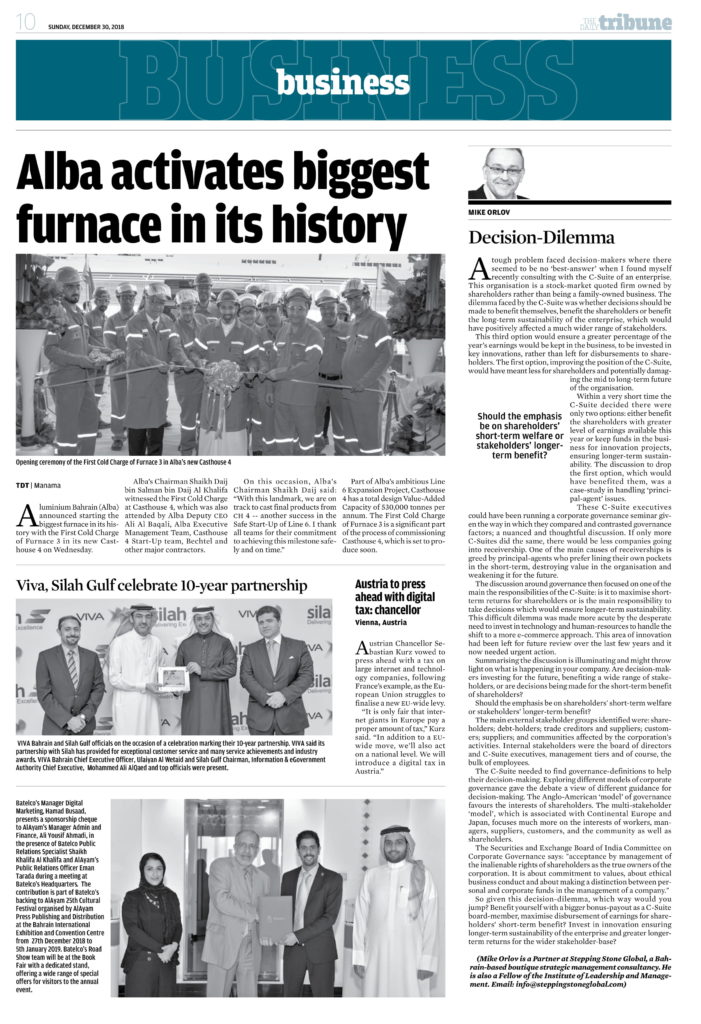Decision-Dilemma
A tough problem faced decision-makers where there seemed to be no ‘best-answer’ when I found myself recently consulting with the C-Suite of an enterprise. This organisation is a stock-market quoted firm owned by shareholders rather than being a family-owned business. The dilemma faced by the C-Suite was whether decisions should be made to benefit themselves, benefit the shareholders or benefit the long-term sustainability of the enterprise, which would have positively affected a much wider range of stakeholders.
This third option would ensure a greater percentage of the year’s earnings would be kept in the business, to be invested in key innovations, rather than left for disbursements to shareholders. The first option, improving the position of the C-Suite, would have meant less for shareholders and potentially damaging the mid to long-term future of the organisation.
Within a very short time the C-Suite decided there were only two options: either benefit the shareholders with greater level of earnings available this year or keep funds in the business for innovation projects, ensuring longer-term sustainability. The discussion to drop the first option, which would have benefited them, was a case-study in handling ‘principal-agent’ issues.
These C-Suite executives could have been running a corporate governance seminar given the way in which they compared and contrasted governance factors; a nuanced and thoughtful discussion. If only more C-Suites did the same, there would be less companies going into receivership. One of the main causes of receiverships is greed by principal-agents who prefer lining their own pockets in the short-term, destroying value in the organisation and weakening it for the future.
The discussion around governance then focused on one of the main the responsibilities of the C-Suite: is it to maximise short-term returns for shareholders or is the main responsibility to take decisions which would ensure longer-term sustainability. This difficult dilemma was made more acute by the desperate need to invest in technology and human-resources to handle the shift to a more e-commerce approach. This area of innovation had been left for future review over the last few years and it now needed urgent action.
Summarising the discussion is illuminating and might throw light on what is happening in your company. Are decision-makers investing for the future, benefiting a wide range of stakeholders, or are decisions being made for the short-term benefit of shareholders?
Should the emphasis be on shareholders’ short-term welfare or stakeholders’ longer-term benefit?
The main external stakeholder groups identified were: shareholders; debt-holders; trade creditors and suppliers; customers; suppliers; and communities affected by the corporation’s activities. Internal stakeholders were the board of directors and C-Suite executives, management tiers and of course, the bulk of employees.
The C-Suite needed to find governance-definitions to help their decision-making. Exploring different models of corporate governance gave the debate a view of different guidance for decision-making. The Anglo-American ‘model’ of governance favours the interests of shareholders. The multi-stakeholder ‘model’, which is associated with Continental Europe and Japan, focuses much more on the interests of workers, managers, suppliers, customers, and the community as well as shareholders.
The Securities and Exchange Board of India Committee on Corporate Governance says: “acceptance by management of the inalienable rights of shareholders as the true owners of the corporation. It is about commitment to values, about ethical business conduct and about making a distinction between personal and corporate funds in the management of a company.”
So given this decision-dilemma, which way would you jump? Benefit yourself with a bigger bonus-payout as a C-Suite board-member, maximise disbursement of earnings for shareholders’ short-term benefit? Invest in innovation ensuring longer-term sustainability of the enterprise and greater longer-term returns for the wider stakeholder-base?

